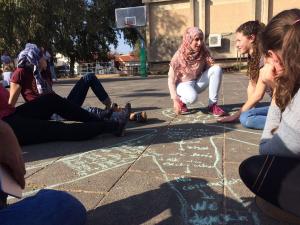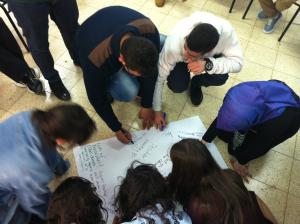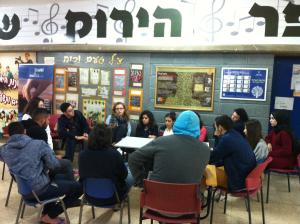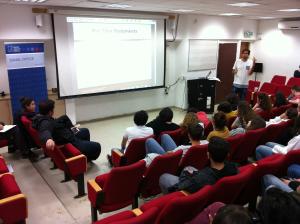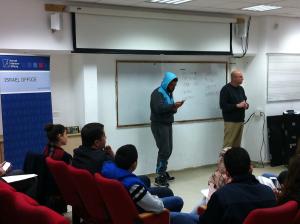The seminar has started with an opening session and the notion that dialogue alone is useless without understanding the other and being active in one’s community. Therefore it is important to know the narrative of the other side but also to create a common story and to become active in order to leave a mark on the society. After the opening the participants have watched the TED talk video of Chimamanda Ngozi Adichie “The danger of a single story” and learned how important is to open the mind for other perceptions and stories of others. At the end of this session two students of Eastern Mediterranean International School (EMIS) performed a spoken word poem.
After the opening session the students were divided into mixed groups of Israelis and Palestinians and participated in a student-led orientation activity to get to know each other better. Then they set common rules as well as goals and aspirations for the seminar. Afterwards each group watched the short film “Barriers” which presents various perspectives regarding the tough reality of the checkpoints. The students were challenge to contemplate about the environment that each character in the film grew up in, the fears of the characters, their goals in the conflict, why are they in a checkpoint and what is each one’s inner-conflict in the film? After analyzing the perspectives of the characters the groups came together and acted the roles of different characters in the film. Then the students reflected their feelings about represented the perspectives of contradicting figures.
After a festive Shabat dinner the students gathered again to share their personal narratives. Everyone brought a text, quote or book with a personal value for oneself, read from it and explained why it is personally meaningful. Each one shared with the group a personal story and explained why they had come to the seminar.
On the morning of the second day Dr. Yuval Benziman came to give a lecture and a workshop about narratives and conflict management. The participants learned what a group narrative is and were asked about the need of it. Dr. Benziman emphasized that in every conflict each side feels as a victim and then the students were divided again into groups to discuss the common elements and similar traits both Palestinians and Israelis share. When the groups returned to the hall they elaborated on the similarities between them and deliberated whether their different narratives should bring them apart and whether they can find a common story to tell in order to become active on both sides.
Following the workshop Noa Gur Golan and Fayrouze Rizqallah came to talk with the students about their social and political activity. Noa shared with them her experience as an activist in the peace movement of “women wage peace”. She described activism to a train, where in the beginning you are alone on it but as you continue driving more and more people jump in. Fayrouze shared her knowledge as a social entrepreneur and the elements of effective Jewish-Arab encounter groups.
The last session was held by the principal of EMIS, Gili Roman, who introduced the participants to the principles of Systematic Inventive Thinking as part of problem solving methods. He explained that we usually have a fixed mind but we must train our minds to flexible and innovative in order to solve problems. Then the students practiced in groups the method of reverse engineering and tried to solve different problems such as bias in media, garbage disposal on beaches, lack of knowledge of Hebrew and Arabic etc. In the end the students sat down in circles and expressed their reflections from the seminar as well as their thoughts about future actions. Their responses were positive and most of them mentioned their wish to meet again and to be active in order to change their personal environment. The students emphasized that it was very special for them not only to hear the other side but also to have a personal encounter and exchange of opinions.



